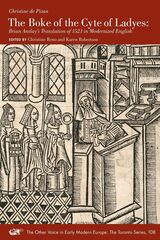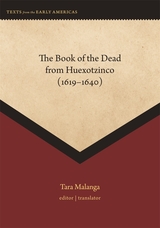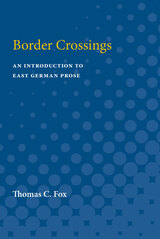6 books about Pruitt, Paul M.
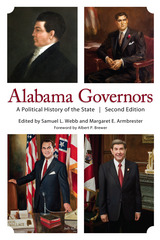
Alabama Governors
A Political History of the State
Samuel L. Webb
University of Alabama Press, 2014
An entirely revised and updated edition of the best-selling 2001 original
This collection of biographical essays, written by thirty-four noted historians and political scientists, chronicles the times, careers, challenges, leadership, and legacies of the fifty-seven men and one woman who have served as the state's highest elected official. The book is organized chronologically into six sections that cover Alabama’s years as a US territory and its early statehood, the 1840s through the Civil War and Reconstruction, the late nineteenth-century Bourbon era, twentieth-century progressive and wartime governors, the Civil Rights era and George Wallace’s period of influence, and recent chief executives in the post-Wallace era.
The political careers of these fifty-eight individuals reflect the story of Alabama itself. Taken together, these essays provide a unified history of the state, with its recurring themes of race, federal-state relations, tensions between north and south Alabama, economic development, taxation, and education.
Alabama Governors expertly delineates the decisions and challenges of the chief executives, their policy initiatives, their accomplishments and failures, and the lasting impact of their terms. The book also includes the true and sometimes scandalous anecdotes that pepper Alabama’s storied history. Several of the state's early governors fought duels; one killed his wife's lover. A Reconstruction era-governor barricaded himself in his office and refused to give it up when voters failed to reelect him. A twentieth-century governor, an alumnus of Yale, served as an officer in the Ku Klux Klan.
This entirely updated and revised edition includes enlarged and enhanced images of each governor. Published as Alabama prepares for its sixty-fourth gubernatorial election, Alabama Governors is certain to become a valuable resource for teachers, students, librarians, journalists, and anyone interested in the colorful history of Alabama politics.
This collection of biographical essays, written by thirty-four noted historians and political scientists, chronicles the times, careers, challenges, leadership, and legacies of the fifty-seven men and one woman who have served as the state's highest elected official. The book is organized chronologically into six sections that cover Alabama’s years as a US territory and its early statehood, the 1840s through the Civil War and Reconstruction, the late nineteenth-century Bourbon era, twentieth-century progressive and wartime governors, the Civil Rights era and George Wallace’s period of influence, and recent chief executives in the post-Wallace era.
The political careers of these fifty-eight individuals reflect the story of Alabama itself. Taken together, these essays provide a unified history of the state, with its recurring themes of race, federal-state relations, tensions between north and south Alabama, economic development, taxation, and education.
Alabama Governors expertly delineates the decisions and challenges of the chief executives, their policy initiatives, their accomplishments and failures, and the lasting impact of their terms. The book also includes the true and sometimes scandalous anecdotes that pepper Alabama’s storied history. Several of the state's early governors fought duels; one killed his wife's lover. A Reconstruction era-governor barricaded himself in his office and refused to give it up when voters failed to reelect him. A twentieth-century governor, an alumnus of Yale, served as an officer in the Ku Klux Klan.
This entirely updated and revised edition includes enlarged and enhanced images of each governor. Published as Alabama prepares for its sixty-fourth gubernatorial election, Alabama Governors is certain to become a valuable resource for teachers, students, librarians, journalists, and anyone interested in the colorful history of Alabama politics.
[more]
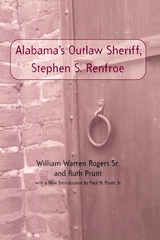
Alabama's Outlaw Sheriff, Stephen S. Renfroe
William Warren Rogers
University of Alabama Press, 2005
A vignette of local Southern history
Among the villains, heroes, rogues and demigods who inhabit Southern folklore, Stephen S. Renfroe deserves a place. In the twentieth-century a few popular magazine and newspaper articles have been written about Renfroe, while Carl Carmer’s Stars Fell on Alabama, published in 1934, devoted several pages to him. Other than this, all is previously know about the enigmatic sheriff who because an outlaw is in the form of a legend.
In general, Renfroe appeared in the Black Belt town of Livingston, Alabama in the late 1860s and quickly became a member of the Ku Klux Klan. Allegedly playing a major role in driving out carpetbaggers and ridding Sumter County of Radical Republican rule, he was awarded with the office of sheriff. However, he reverted to a pattern of crime that earned him disgrace and ostracism.
As to his origins, his background, and the details of his career—much has been speculated but little has been documented. Although no statue commemorates Renfroe’s role as a statesman, educator, or solider (his highest military rank was that of private), a case can be made that he helped shape the course of politics in Alabama’s Black Belt.
Among the villains, heroes, rogues and demigods who inhabit Southern folklore, Stephen S. Renfroe deserves a place. In the twentieth-century a few popular magazine and newspaper articles have been written about Renfroe, while Carl Carmer’s Stars Fell on Alabama, published in 1934, devoted several pages to him. Other than this, all is previously know about the enigmatic sheriff who because an outlaw is in the form of a legend.
In general, Renfroe appeared in the Black Belt town of Livingston, Alabama in the late 1860s and quickly became a member of the Ku Klux Klan. Allegedly playing a major role in driving out carpetbaggers and ridding Sumter County of Radical Republican rule, he was awarded with the office of sheriff. However, he reverted to a pattern of crime that earned him disgrace and ostracism.
As to his origins, his background, and the details of his career—much has been speculated but little has been documented. Although no statue commemorates Renfroe’s role as a statesman, educator, or solider (his highest military rank was that of private), a case can be made that he helped shape the course of politics in Alabama’s Black Belt.
[more]
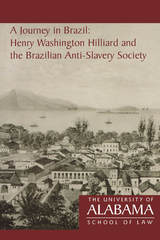
A Journey in Brazil
Henry Washington Hilliard and the Brazilian Anti-Slavery Society
David I. Durham and Paul M. Pruitt Jr.
University of Alabama Press, 2008
A Journey in Brazil: Henry Washington Hilliard and the Brazilian Anti-Slavery Society is an investigative account of the vital career of Henry Washington Hilliard, who had a long and complicated relationship with slavery. A native Southerner, he was a former slave owner and Confederate soldier, but as a member of Congress Hilliard strongly opposed secession. Hilliard supported the constitutional legality of slavery; however, as a moderate he acknowledged the status quo and warned of the dangers of radical positions concerning the issue.
Throughout a diverse career that spanned six decades, Hilliard’s personal challenges, moderated by his faith in Divine Providence, eventually allowed him to return to his ideological roots and find a sense of redemption late in life by becoming an unlikely spokesman for the Brazilian emancipation movement through his association with Joaquim Nabuco. In A Journey in Brazil, authors David I. Durham and Paul M. Pruitt Jr. establish context for Hilliard’s beliefs, document his journey in Brazil, and offer a variety of primary documents—selections from newspapers, transcripts of letters, translations of speeches, and other documents that have never before been published.
AboutOccasional Publications of the Bounds Law Library
This collection offers a series of edited documents that contribute to an understanding of the development of legal history, culture, or doctrine. Series editors Paul M. Pruitt Jr. and David I. Durham have selected a variety of materials—a lecture, diaries, letters, speeches, a ledger, commonplace books, a code of ethics, court reports—to illustrate unique examples of legal life and thought.
Throughout a diverse career that spanned six decades, Hilliard’s personal challenges, moderated by his faith in Divine Providence, eventually allowed him to return to his ideological roots and find a sense of redemption late in life by becoming an unlikely spokesman for the Brazilian emancipation movement through his association with Joaquim Nabuco. In A Journey in Brazil, authors David I. Durham and Paul M. Pruitt Jr. establish context for Hilliard’s beliefs, document his journey in Brazil, and offer a variety of primary documents—selections from newspapers, transcripts of letters, translations of speeches, and other documents that have never before been published.
AboutOccasional Publications of the Bounds Law Library
This collection offers a series of edited documents that contribute to an understanding of the development of legal history, culture, or doctrine. Series editors Paul M. Pruitt Jr. and David I. Durham have selected a variety of materials—a lecture, diaries, letters, speeches, a ledger, commonplace books, a code of ethics, court reports—to illustrate unique examples of legal life and thought.
[more]
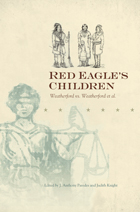
Red Eagle's Children
Weatherford vs. Weatherford et al.
Edited by J. Anthony Paredes and Judith Knight
University of Alabama Press, 2012
Red Eagle’s Children presents the legal proceedings in an inheritance dispute that serves as an unexpected window on the intersection of two cultural and legal systems: Creek Indian and Euro-American.
Case 1299: Weatherford vs. Weatherford et al. appeared in the Chancery Court of Mobile in 1846 when William “Red Eagle” Weatherford’s son by the Indian woman Supalamy sued his half siblings fathered by Weatherford with two other Creek women, Polly Moniac and Mary Stiggins, for a greater share of Weatherford’s estate. While the court recognized William Jr. as the son of William Sr., he nevertheless lost his petition for inheritance due to the lack of legal evidence concerning the marriage of his biological mother to William Sr. The case, which went to the Alabama Supreme Court in 1851, provides a record of an attempt to interrelate and, perhaps, manipulate differences in cultures as they played out within the ritualized, arcane world of antebellum Alabama jurisprudence.
Although the case has value in the classic mold of salvage ethnography of Creek Indian culture, Red Eagle’s Children, edited by J. Anthony Paredes and Judith Knight, shows that its more enduring value lies in being a source for historical ethnography—that is, for anthropological analyses of cultural dynamics of the past
events that complement the narratives of professional historians.
events that complement the narratives of professional historians.
Contributors
David I. Durham / Robbie Ethridge / Judith
Knight / J. Anthony Paredes / Paul M. Pruitt
Jr. / Nina Gail Thrower / Robert Thrower /
Gregory A. Waselkov
David I. Durham / Robbie Ethridge / Judith
Knight / J. Anthony Paredes / Paul M. Pruitt
Jr. / Nina Gail Thrower / Robert Thrower /
Gregory A. Waselkov
[more]
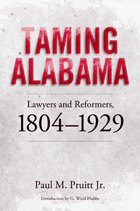
Taming Alabama
Lawyers and Reformers, 1804-1929
Paul M. Pruitt, introduction by G. Ward Hubbs
University of Alabama Press, 2010
Taming Alabama focuses on persons and groups who sought to bring about reforms in the political, legal, and social worlds of Alabama. Most of the subjects of these essays accepted the fundamental values of nineteenth and early twentieth century white southern society; and all believed, or came to believe, in the transforming power of law. As a starting point in creating the groundwork of genuine civility and progress in the state, these reformers insisted on equal treatment and due process in elections, allocation of resources, and legal proceedings.
To an educator like Julia Tutwiler or a clergyman like James F. Smith, due process was a question of simple fairness or Christian principle. To lawyers like Benjamin F. Porter, Thomas Goode Jones, or Henry D. Clayton, devotion to due process was part of the true religion of the common law. To a former Populist radical like Joseph C. Manning, due process and a free ballot were requisites for the transformation of society.
[more]
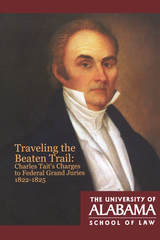
Traveling the Beaten Trail
Charles Tait's Charges to Federal Grand Juries, 1822–1825
Paul M. Pruitt Jr., David I. Durham, and Sally E. Hadden
University of Alabama Press, 2013
In Traveling the Beaten Trail: Charles Tait’s Charges to Federal Grand Juries 1822–1825, a concise and essential addition to the Occasional Publications of the Bounds Law Library, authors Paul M. Pruitt Jr., David I. Durham, and Sally E. Hadden capture the life, achievements, and legacy of federal judge Charles Tait. Throughout his colorful career, Tait left an unmistakable impression on Alabama politics. He had a major influence over the federal bar and its practice, and he also made it his personal responsibility to educate the public. Traveling the Beaten Trail offers a brief biographical account of Charles Tait’s life, highlighting various noteworthy events, such as the array of professions he undertook—from professor, to planter, to lawyer, to senator. The remainder of the text focuses on in-depth analyses of Tait's grand jury charges for 1822, 1824, and 1825.
About Occasional Publications of the Bounds Law Library
This collection offers a series of edited documents that contribute to an understanding of the development of legal history, culture, or doctrine. Series editors Paul M. Pruitt Jr. and David I. Durham have selected a variety of materials—a lecture, diaries, letters, speeches, a ledger, commonplace books, a code of ethics, court reports—to illustrate unique examples of legal life and thought.
About Occasional Publications of the Bounds Law Library
This collection offers a series of edited documents that contribute to an understanding of the development of legal history, culture, or doctrine. Series editors Paul M. Pruitt Jr. and David I. Durham have selected a variety of materials—a lecture, diaries, letters, speeches, a ledger, commonplace books, a code of ethics, court reports—to illustrate unique examples of legal life and thought.
[more]
READERS
Browse our collection.
PUBLISHERS
See BiblioVault's publisher services.
STUDENT SERVICES
Files for college accessibility offices.
UChicago Accessibility Resources
home | accessibility | search | about | contact us
BiblioVault ® 2001 - 2025
The University of Chicago Press




